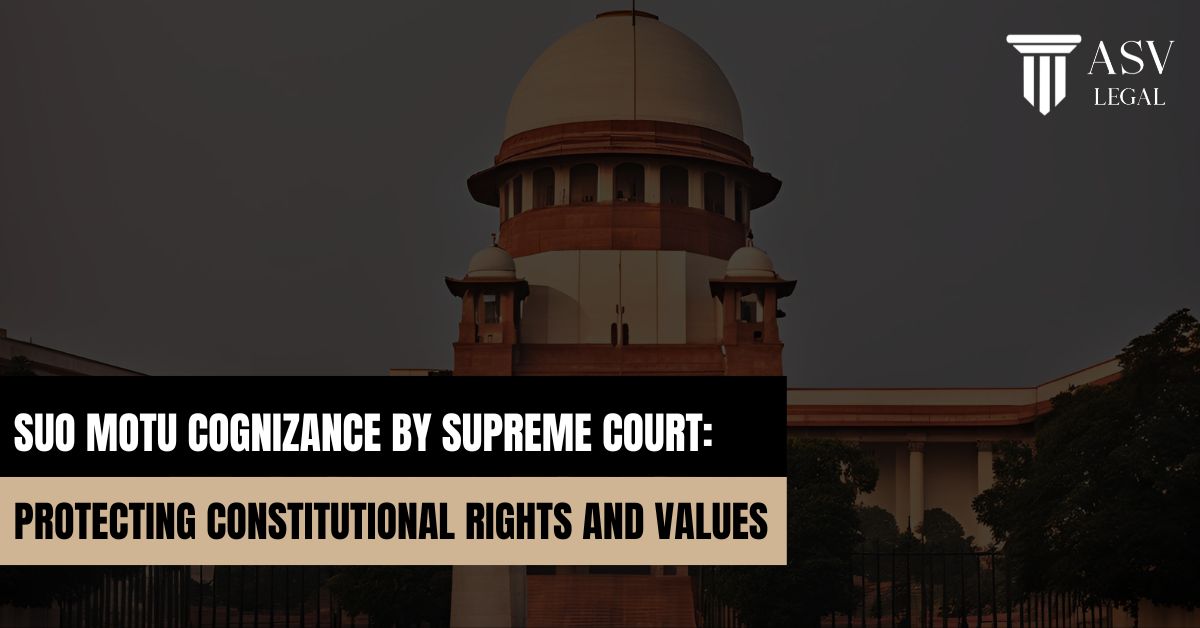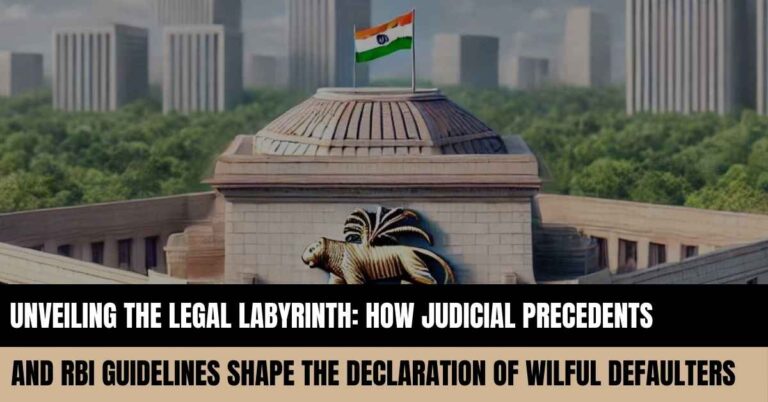Written By: Aastha Arora
“Suo motu is not defined anywhere, but law keeps developing and when the need arises, judges need to act conscientiously”[1]
– Justice Gyan Sudha Misra, former Supreme Court Judge
In the recent instance of the heinous crime of rape and murder of a 31-year-old Doctor in RG Kar Medical College and Hospital, the Hon’ble Supreme Court took Suo Motu Cognizance and stated:
“The reason why we have decided to take this Suo Motu matter is because this is not a matter related to a particular murder which took place in a hospital in Kolkata. It raises systemic issues related to the safety of doctors across India,” [2]
-Chief Justice of India DY Chandrachud
Suo Motu cognizance plays an imperative role in protecting the rights and freedoms of citizens. This judicial intervention underscores the Court’s prerogative to initiate proceedings autonomously, particularly in matters where gross violations of fundamental rights and the rule of law are implicated. The decision to take Suo Motu cognizance reflects the Court’s heightened vigilance in ensuring that such heinous crimes are met with the full measure of legal scrutiny, thereby reinforcing the judiciary’s role as the ultimate sentinel of justice and protector of civil liberties.[3]
The Supreme Court’s authority to take Suo Motu cognizance stems from Article 32 of the Constitution, which empowers the Court to enforce fundamental rights, and Article 142, which permits the Court to issue any order necessary to ensure complete justice. The genesis of Suo Motu lies in the concept of “Epistolary Jurisdiction,” which emerged during the late 1970s as a product of judicial activism aimed at making the judicial process more accessible to the poor and the socially and economically disadvantaged sections of society.
This move is emblematic of the Court’s broader mandate to address issues of profound public concern, even in the absence of formal petitions, thereby affirming its proactive stance in upholding justice in cases that resonate deeply with the societal conscience.
Notable Instances where Suo Motu Cognizance was exercised by the Hon’ble Supreme Court:
In Re Alleged Rape and Murder Incident of a Trainee Doctor in R.G. Kar Medical College and Hospital, Kolkata and Related Issues[4]:
The Supreme Court of India exercised its Suo Motu cognizance in relation to the grievous incident of rape and murder that transpired in Kolkata. The Court emphasized the need for the safety and well-being of medical professionals and directed the establishment of a National Task Force (NTF).
In Re Recruitment of visually impaired in judicial services[5]:
The Supreme Court took Suo Motu cognizance regarding the recruitment of visually impaired candidates in the Madhya Pradesh judicial services. The Court issued interim directions allowing visually impaired candidates who met the minimum qualifying marks in the preliminary examination to appear for the main examination, with specific accommodations.
In Re Compensation Amounts Deposited with Motor Accident Claims Tribunals and Labour Courts[6]:
The Supreme Court initiated a Suo Motu writ petition over large sums of money lying deposited in Motor Accident Claims Tribunals (MACT) and labour courts without being given to the beneficiaries.
In Re Policy Strategy for Grant of Bail,[7]:
The Court emphasized the need for courts to impose realistic bail conditions that consider the socio-economic backgrounds of undertrial prisoners. The purpose of granting bail is defeated if the conditions are so stringent that they cannot be met by the accused.
In Re Cognizance for Extension of Limitation:[8]
In response to the challenges posed by the COVID-19 pandemic, the Supreme Court of India took Suo Motu cognizance to address the potential difficulties litigants might face in adhering to statutory timelines. The Court extended the limitation period from March 15, 2020, to February 28, 2022. The Court also provided specific guidelines for calculating the limitation period post-extension, ensuring that litigants are not prejudiced by the delays caused by the pandemic.
Conclusion:
Suo Motu cognizance has proven to be a powerful instrument within the Indian judiciary, allowing it to proactively address critical issues of public interest and safeguard the rights of citizens. By initiating cases on their own, courts can swiftly respond to pressing matters, ranging from environmental protection and human rights to social injustices and governmental accountability. This practice reflects the judiciary’s active role in upholding justice and ensuring the protection of public rights. Suo Motu actions underscore the judiciary’s dedication to maintaining the rule of law and safeguarding the interests of society at large. The recent Suo Motu cognizance taken up by the Hon’ble Supreme Court in numerous vital cases has once again affirmed trust in the judiciary and established its commitment to justice, human rights, and institutional integrity.
[1] Ananya Singh, “From Social Circle Influence on a Judge to Taking up Cases Due to Anger: Former Judges Recount Experience in Handling Suo Motu Matters”, Bar & Bench (Aug. 29, 2023), https://www.barandbench.com/columns/from-social-circle-influence-on-a-judge-to-taking-up-cases-due-to-anger-former-judgesrecount-experience-in-handling-suo-motu-matters.
[2] RG Kar Hospital Case: “Can’t Wait for Another Rape for Things to Change” – Supreme Court Forms Task Force on Doctor’s Safety, LiveLaw (Aug. 29, 2023), https://www.livelaw.in/top-stories/rg-kar-hospital-case-cant-wait-for-another-rape-for-things-to-change-supreme-court-forms-task-force-on-doctors-safety-267101.
[3] “Supreme Court’s Suo Motu Power: An Analysis”, Bar & Bench (Aug. 20, 2020), https://www.barandbench.com/columns/supreme-courts-suo-moto-power-an-analysis.
[4] “In Re Alleged Rape and Murder Incident of a Trainee Doctor in R.G. Kar Medical College and Hospital, Kolkata and Related Issues”, SMW (Crl) No. 2 of 2024 (Supreme Court of India).
[5] In Re Recruitment of Visually Impaired in Judicial Services, Suo Moto Writ Petition No. 2/2024 (Supreme Court of India)
[6]In Re Compensation Amounts Deposited with Motor Accident Claims Tribunals and Labour Courts Supreme Court of India, Suo Motu Writ (C) No. 7 of 2024
[7] In Re Policy Strategy for Grant of Bail, SMW (Crl.) No. 4 of 2021, Supreme Court of India (2023)
[8] In Re Cognizance for Extension of Limitation, Misc. Appl. No. 21 of 2022 in Misc. Appl. No. 665 of 2021 in Suo Motu Writ Pet. (C) No. 3 of 2020, Supreme Court of India (2022).


